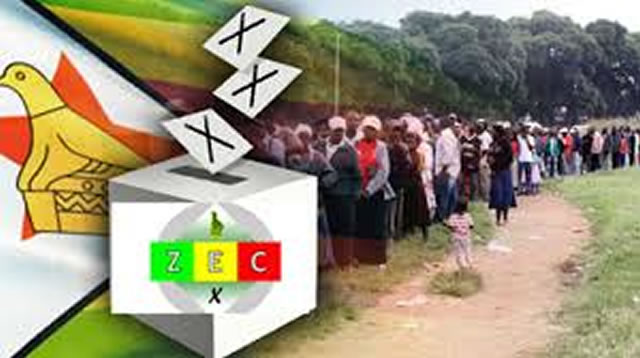
ZIMBABWE’S repeated failure to ratify the African Charter on elections and good governance may be the clearest indicator yet that nothing significant will be happening in the direction of electoral reforms ahead of the 2018 harmonised general elections.
guest column: LEARNMORE ZUZE
Electoral reforms, despite fervent calls from the opposition, are unlikely under the current establishment and the sooner the opposition realises this unyielding truth, the more they can better strategise.
With the 2018 general elections edging closer and most political parties hitting the campaign trail, talk of electoral reforms continues to hog the limelight.
But are electoral reforms even possible in Zimbabwe, seeing as it is that government has remained evasive on the matter?
Zimbabwe, at one time, was even mandated by the continental body (African Union) to safeguard democracy in Africa during President Robert Mugabe’s tenure as the chair, but a marked indifference persisted against local electoral reforms.
Almost 10 years after the adoption of the African Charter, Zimbabwe has neither signed nor ratified the treaty and it logically follows that nothing much is likely to change in the perceivable future.
The opposition would do well to grasp this hint. History bears testimony that very few elections in Zimbabwe have ever fallen in the free-and-fair category; there had to be mayhem somehow.
- Chamisa under fire over US$120K donation
- Mavhunga puts DeMbare into Chibuku quarterfinals
- Pension funds bet on Cabora Bassa oilfields
- Councils defy govt fire tender directive
Keep Reading
Even across the world, violence is a likely factor, but the African story in general weighs a ton.
Violence in African elections is a given. Accusations of rigging, voter intimidation and displacement of people paint the Africa voting pattern.
It was against this backcloth that the African Charter came into force. The African Charter, among other things, seeks to promote adherence to democratic principles, rule of law and human rights respect among African States.
The Charter was adopted by member States on June 30, 2007 in Addis Ababa, Ethiopia, and came into being in February 2012, following ratification by the 15th member State.
Zimbabwe, nonetheless, remains one of the eight countries that have not signed and ratified this charter alongside Libya, Gambia, Eritrea, Egypt, Botswana, Seychelles and Tanzania. Only 24 countries have signed and ratified.
Clearly, there is a notable flurry of activities in Zimbabwe as parties jostle to convince the electorate yet, unbeknown to them, electoral reforms may be the decisive factor on who occupies State House next year.
Everything else may be secondary. Morgan Tsvangirai’s MDC-T has been on a nationwide trail evaluating and gauging whether an alliance with the embattled Joice Mujuru’s party, Zimbabwe People First (ZimPF), may yield a result to end Zanu PF’s iron grip on power.
On its part, the Christian-led opposition party, Transform Zimbabwe, has embarked on a meet-the-people campaign using clean-up campaigns nationwide.
The much-talked about Coalition for Democrats (Code), however, is yet to roll its campaign strategy. Code comprises the Welshman Ncube-led MDC, Simba Makoni’s Mavambo/Kusile/Dawn, Dare led by Gilbert Dzikiti, Zunde (Farai Mbira), PDZ (Barbra Nyagomo), Renewal Democrats of Zimbabwe (Elton Mangoma), Dumiso Dabengwa’s Zapu, Biti’s People’s Democratic Party (PDP) and Maxwell Shumba’s Zimbabwe First.
Zimbabwe presently has 25 registered political parties, but the concerning question is: Can the opposition achieve this daunting task? Will Zanu PF agree to reform itself out of power by consenting to electoral reforms?
The Tsvangirai-led MDC-T has not taken part in an election since 2013, stemming from electoral irregularities.
And the efficacy of the boycott stance adopted by the main opposition party has always ignited intense debate while the government has adopted a noncommittal approach to the call for reforms.
While some have been quick to shred the MDC-T for staying away from elections, the situation regarding participating in elections in Zimbabwe certainly puts the opposition in a quandary.
The playing field is not and has never been smooth; it is actually a damning indictment on Zanu PF that it lost in 2008 to a candidate, who was denied access to certain constituencies owing to violence.
Even more, the voters’ roll had shocking irregularities. The situation, therefore, remains cryptic for the opposition: If they should participate under a furrowed playing field and lose, they will be condemned as happened in 2013.
If they should stay away, they will equally be savaged for failing Zimbabweans.
The situation is sticky to the core. The call for electoral reforms, noble in every other way, may not see the light of day.
There seems to be no interest whatsoever in the present government to ratify the charter.
This, in my view, does not call for an actuarial scientist; electoral reforms could be the very thing that changes the game and the ruling party is fully awake to this.
The opposition has argued that contempt of such continental legal provisions as in the African Charter is an act of design meant to safeguard hegemonic rule.
Now, while it is true that such international laws need closer scrutiny and that nations cannot just dash to ratify, the case of Zimbabwe would be curious given the length of time taken, assuming there was scrutiny taking place.
When a State chairs a continental body, the general assumption is that they, in essence and character, represent the virtues they extol as a group. Failure to endorse the charter can only mean reluctance.
It, therefore, becomes incumbent upon the opposition to comprehend that a new way of looking at the political landscape is very urgent. Electoral reforms, as of now, remain pie in sky.
Learnmore Zuze is a law officer and writes in his own capacity. E-mail: [email protected]











